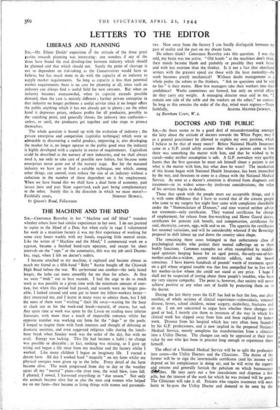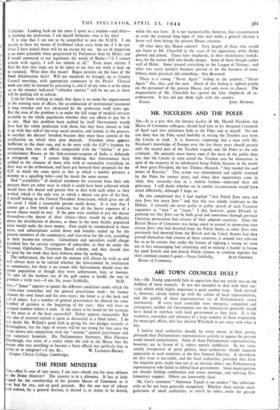DOCTORS AND THE PUBLIC
Sia,—As there seems to be a good deal of misunderstanding amongst the laity about the attitude of doctors towards the White Paper, may I as a general practitioner be allowed to explain my own position, which I believe to be that of many more? Before National Health Insurance came in a G.P. could safely assume that when a patient came to him there was something the matter with him, and that he wished to be cured—today neither assumption is safe. A G.P. nowadays very quickly learns that the first question he must ask himself about a patient is not what is the matter with him, but what does he want? The inculcation of this lesson began with National Health Insurance, has been intensified by the war, and threatens to come to a climax with the National Medical Service. As soon as a doctor's attention is diverted from diagnosis and treatment—in its widest sense—by irrelevant considerations, the value of his services begins to decline.
Those that speak with the people must say acceptable things, and it is with some diffidence that I have to record that of the sixteen people who came to my surgery last night four came with complaints classifiable under the " Nomenclature of Diseases," and nine wanted neither advice nor treatment—only certificates. They wanted certificates for change of employment, for release from fire-watching and Home Guard duties, certificates for pension sick benefit, and compensation, certificates for coal, electricity, corsets, eggs, milk and so on. The appetite for certificates has seasonal variations, and will be considerably whetted if the Beveridge proposal to shift labour up and down the country takes shape.
The remaining three cases belonged to that unfortunate class of psychological misfits who project their mental sufferings on to their bodily functions. Common examples are often exemplified by middle- aged spinsters keeping house for an aged parent, the-only-son-of-his- mother-and-she-a-widow, patent medicine addicts, and the bowel conscious. I have known hundreds of pounds' worth of treatment spent on a girl whose original trouble was that fate compelled her to live with her mother-in-law whom she could not stand at any price. I hope I shall not be suspected of jesting about these people's troubles, who base my very sincere sympathy. The point is, however, that society will never achieve positive or any other sort of health by projecting them on to the doctor.
During the last thirty years the G.P. has had to face the loss, one after another, of whole sections of clinical experience—tuberculosis, venereal disease, fevers, school children, minor surgery, midwifery, fractures and so on. I am not concerned to argue here whether these changes are good or bad, I merely cite them as instances of the way in which his clinical work has slipped away from him and been replaced by baboo work. Divorce from his hospital which has very often been founded by his G.P. predecessors, and is now implied in the proposed National Medical Service, merely completes his transformation from a clinician into a Utility Doctor. The changes can only be appraised at their true value by one who fias been in practice long enough to experience them himself.
The effect of a National Medical Service will be to split the profession into castes—the Utility Doctors and the Clinicians. The duties of the former will be to sign the interminable certificates (and his income will depend on his complaisance in doing so), and he will write the reports and returns and generally furnish the pabulum on which bureaucracy fflietthes. He may carry out a few inoculations and dispense a few pills, but the interest of the work for which he was trained will be gone. The Clinicians will take it all. Patients who require treatment will soon learn to by-pass the Utility Doctor and demand to be seen by the
Clinicians. Looking back on the years I spent as a student—and after— in learning my profession, I ask myself forlornly—was it for this? It is true that I am not to be compelled to join the N.M.S. I am merely to have my means of livelihood taken away from me if I do not. Once I have joined there will be no escape for me. An act of despotism is no more palatable when perpetrated by Parliament than by Hitler, and I would commend to our legislators the words of Burke—" if I cannot reform with equity, I will not reform at .all." Even more sinister I find the hint that steps are to be taken to see that .my work is kept up to standard. What does this mean? Bogus patients on the lines of the Peed Adulteration Acts? Will my misdeeds be brought up at County Council meetings, with appropriate comments in the Press? Clinical work can only be learned by practising it, and if all my time is to be taken up in the manner indicated "refresher courses " will be no use as there will be nothing left to refresh.
I am far•from wishing to imply that there is no room for improvement in the existing state of affairs, the co-ordination of institutional treatment is long overdue and was advocated by the profession itself years ago. But the crux of the problem is to make the full range of medical services available to the whole population whether they can afford to pay for it or not. Had this problem been tackled by itself Government would have had the whole profession with them, but they have chosen to link it up with that will-o'-the-wisp social security, and intend, in the process, to sacrifice the doctors' freedom because they must have control of the certification on which their plan depends. Freedom often appears inefficient in the short run, and to do away with the G.P.'s freedom by converting him into an official comparable with the " fetcher " of pre- revolutionary Russia, or the Sub-assistant-surgeon of India is definitely a retrograde step. I cannot help thinking that Government have yielded to the clamour of those who wish to nationalise everything on their way to the millennium, and have put forward their proposals for the G.P. in much the same spirit• as that in which a mother presents a dummy to a squalling baby—and for much the same reason.
Had "availability" of medical treatment for everyone been their sole Concern there are other ways in which it could have been achieved which would have left doctor and patient free to deal with each other as they wished, which is the only way in which a doctor can give of his best. I myself belong to the Central Provident Association, which gives me all the cover I think a reasonable person could desire. It is true that I cannot get a free bottle of medicine, but all the heavy expenses of a severe illness would be met. If the poor were enabled to pay the doctor themselves—the doctor of their choice—there would be no difficulty about the distribution of doctors, as those in the most thickly populated areas would make the most money. Fees could be standardised in those areas, and subscriptions scaled down and benefits scaled up for the poorest members of the community, and vice-versa for the rich, according to their income-tax returns. Consultants and specialists could charge standard fees for certain categories of subscriber, as they do under the National Ophthalmic Treatment Board scheme, and they should also be paid for the work they have hitherto done for nothing.
The unfortunate, the lazy and the morons will always be with us and will always have to be carried whether the Government be totalitarian or communist, but there is no reason why Government should treat the whole population as though they were unfortunate, lazy, or morons. To take all the bunkers out of the golf course is hardly the way to produce a virile race.—I am, Sir, yours faithfully, M.D.



























 Previous page
Previous page